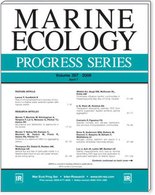
MARINE ECOLOGY PROGRESS SERIES
Scope & Guideline
Connecting researchers to oceanic discoveries.
Introduction
Aims and Scopes
- Marine Biodiversity and Community Dynamics:
Research on the diversity of marine species, their interactions, and the dynamics of community structure in various marine ecosystems, including coral reefs, estuaries, and deep-sea environments. - Ecological Responses to Climate Change:
Studies examining how marine organisms and ecosystems respond to climate change, including shifts in distribution, phenology, and community composition. - Trophic Interactions and Food Web Dynamics:
Investigations into the feeding relationships between species, including predator-prey dynamics and the role of various species in ecosystem functioning. - Habitat Restoration and Management:
Research focused on the restoration of marine habitats, such as seagrass meadows and coral reefs, as well as the management strategies to enhance marine biodiversity. - Human Impacts on Marine Ecosystems:
Studies addressing the effects of pollution, overfishing, climate change, and habitat degradation on marine life and ecosystem health. - Methodological Innovations in Marine Ecology:
Development and application of new methodologies, including advanced monitoring techniques, modeling approaches, and analytical tools for marine ecological research.
Trending and Emerging
- Ecological Connectivity and Network Dynamics:
Research on how marine species and habitats are interconnected, emphasizing the importance of connectivity for ecosystem resilience and management. - Impacts of Marine Heatwaves and Climate Variability:
Increased focus on the effects of marine heatwaves on marine organisms and ecosystems, exploring adaptive responses and long-term ecological consequences. - Ecosystem Services and Human Well-being:
Studies examining the link between marine ecosystems and the services they provide to human populations, including fisheries, tourism, and coastal protection. - Genomic and Molecular Approaches in Marine Ecology:
Emerging use of genomic techniques and molecular tools to study biodiversity, population structure, and adaptability of marine organisms in changing environments. - Citizen Science and Public Engagement:
Growing interest in utilizing citizen science initiatives to gather ecological data and engage the public in marine conservation efforts.
Declining or Waning
- Traditional Fisheries Management Approaches:
Research focused on conventional fisheries management strategies has decreased, possibly due to an increasing recognition of the need for ecosystem-based management and the consideration of broader ecological interactions. - Static Habitat Assessments:
Studies that rely solely on static assessments of habitats without considering dynamic processes and changes over time are becoming less common, as there is a growing emphasis on understanding temporal variability and resilience. - Localized Species Studies:
Research that focuses exclusively on single species in isolation is waning in favor of studies that consider community interactions and ecosystem-level processes. - Invasive Species Management:
While still relevant, the frequency of studies specifically targeting invasive species management strategies appears to be declining, as broader ecological impacts and community interactions are prioritized.
Similar Journals

ACTA ADRIATICA
Advancing knowledge of the Adriatic Sea and beyond.ACTA ADRIATICA is a distinguished journal dedicated to the field of oceanography, published by the renowned INST OCEANOGRAFIJU I RIBARSTVO in Croatia. With its ISSN 0001-5113 and E-ISSN 1846-0453, this journal offers a rigorous platform for researchers and practitioners to explore and disseminate critical studies related to the Adriatic Sea and broader marine environments. Despite its categorization in Q4 of Oceanography and a current rank of #98/145 in the Scopus database, ACTA ADRIATICA remains a vital source of knowledge, fostering collaboration and innovation among ocean scientists. The journal invites submissions that contribute to understanding marine ecosystems, biodiversity, and the impacts of climate change, making it an essential resource for advancing research in this ever-evolving discipline. With a publication history extending back to 1973, ACTA ADRIATICA continues to uphold its commitment to enhancing oceanographic literature while promoting open dialogue within the scientific community.
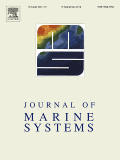
JOURNAL OF MARINE SYSTEMS
Unveiling the Complexities of Our OceansJOURNAL OF MARINE SYSTEMS, published by Elsevier, is a leading academic journal dedicated to advancing the understanding of marine systems through interdisciplinary research. With an impressive impact factor and ranking in the Q1 quartile across various categories such as Aquatic Science, Ecology, and Oceanography, this journal has established itself as an invaluable resource for researchers, professionals, and students interested in marine science and its applications. Since its inception in 1990, the journal has been a platform for high-quality studies, offering insights into complex marine ecosystems, their dynamics, and their interactions with human activities. Notably, it is indexed in major databases, which ensures visibility and accessibility for global audiences. Researchers are encouraged to share their findings and contribute to the ongoing dialogue about the health and sustainability of marine environments.

INTERNATIONAL REVIEW OF HYDROBIOLOGY
Bridging Research and Conservation in Aquatic SciencesINTERNATIONAL REVIEW OF HYDROBIOLOGY is a prestigious academic journal dedicated to the dynamic fields of Aquatic Science and Ecology, Evolution, Behavior, and Systematics. Published by a reputable German publisher, this open-access journal ensures that groundbreaking research is readily available to a global audience, fostering collaboration and innovation within the scientific community. With an impressive impact factor and classification within the Q2 category of both Aquatic Science and Ecology, it ranks notably high on Scopus, standing at 211 out of 721 in Ecology and 84 out of 247 in Aquatic Science as of 2023. Covering a broad scope from fundamental hydrobiological research to applied ecological studies, the journal plays a crucial role in advancing knowledge and addressing contemporary environmental challenges. Researchers, professionals, and students will find INTERNATIONAL REVIEW OF HYDROBIOLOGY to be an essential resource for informing their own work and contributing to the global dialogue on aquatic systems and their conservation.
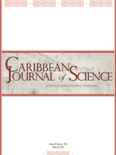
CARIBBEAN JOURNAL OF SCIENCE
Unveiling multidisciplinary insights from the Caribbean region.Caribbean Journal of Science, published by the University of Puerto Rico, serves as a crucial platform for disseminating innovative research in the field of science across the Caribbean region. With an ISSN of 0008-6452, this journal captures the essence of multidisciplinary studies, ranking 47 out of 111 in its category, showcasing a 58th percentile within Scopus. Although it doesn't currently offer Open Access, it has extended its academic reach since its inception in 1980, fostering collaboration and knowledge growth among researchers, professionals, and students alike. The journal covers an expansive range of scientific disciplines and continues to be a vital resource for those seeking to engage with and contribute to the scientific landscape of the Caribbean. For anyone dedicated to advancing scientific inquiry and practice in this vibrant region, the Caribbean Journal of Science represents an invaluable asset.
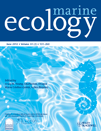
Marine Ecology-An Evolutionary Perspective
Pioneering Research in Aquatic EvolutionMarine Ecology-An Evolutionary Perspective, published by WILEY, is a renowned journal dedicated to advancing the understanding of marine ecosystems through the lens of evolutionary biology. Established in 1980, the journal has firmly positioned itself as a vital resource in the field, currently boasting a 2023 Scopus rank of #337 in Ecology, Evolution, Behavior and Systematics and a Q2 category ranking in Ecology. With a focus on original research and reviews that encompass a broad spectrum of marine ecological studies, this journal critically examines the mechanisms driving marine biodiversity and ecosystem dynamics. Researchers, professionals, and students alike benefit from the journal’s comprehensive insights and robust analyses, which are pivotal for fostering ecological knowledge and informing conservation efforts. Although currently not an Open Access publication, the journal remains accessible through various academic platforms, inviting the scientific community to engage with its vital contributions to aquatic science and the evolutionary processes shaping our oceans. With an impressive trajectory that extends until 2024, Marine Ecology-An Evolutionary Perspective continues to set benchmarks in marine research.
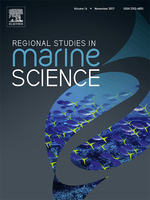
Regional Studies in Marine Science
Fostering Sustainable Practices through Marine StudiesRegional Studies in Marine Science, published by Elsevier, is a leading academic journal dedicated to advancing the understanding of marine ecosystems and their regional dynamics since its inception in 2015. With an ISSN of 2352-4855, this journal is indexed in Scopus and has achieved impressive ranking quartiles, notably Q2 in categories like Animal Science and Zoology, and Ecology, showcasing its relevance and impact in these fields. As of 2023, it ranks in the 79th percentile for Animal Science and Zoology, reflecting its significant contribution to academic discourse. While the journal operates under a traditional access model, its rigorous peer-review process ensures the publication of high-quality research that is crucial for understanding ecological interactions and fostering sustainable practices within marine environments. Researchers, professionals, and students alike will find this journal an invaluable resource for the latest findings and advancements in marine science, as it strives to bridge the gap between research and practical application at regional and global levels.

Research in Marine Sciences
Unveiling the secrets of the seas through rigorous research.Research in Marine Sciences, ISSN 2538-5542, is a leading journal published by ARMAN DARYA INC, specializing in the dynamic and interdisciplinary field of marine science. With a commitment to advancing knowledge in areas such as marine ecology, oceanography, and marine conservation, this journal provides a collaborative platform for researchers, professionals, and students to disseminate their findings. Although it operates under a traditional subscription model, the journal ensures that the latest research is accessible to a wide audience, promoting the understanding of marine environments crucial for biodiversity and sustainability. The journal aims to bridge the gap between theoretical research and practical applications, emphasizing the need for rigorous studies that address pressing marine issues in a rapidly changing world. By contributing to the body of literature in marine sciences, Research in Marine Sciences plays a vital role in shaping the future of marine research and policy-making.

Hidrobiologica
Advancing knowledge in marine biodiversity and ecology.Hidrobiologica is a pivotal academic journal dedicated to the field of aquatic sciences and ecology, published by UNIV AUTONOMA METROPOLITANA-IZTAPALAPA in Mexico. With a commitment to fostering research from diverse ecosystems, this journal encourages the dissemination of knowledge spanning aquatic environments, ecological interactions, and marine biodiversity. Although classified in the Q4 category across various relevant fields such as Aquatic Science and Oceanography, Hidrobiologica is focused on increasing visibility and engagement among scholars by providing a platform for innovative research that addresses contemporary ecological challenges. The journal's address reflects its deep-rooted commitment to local and regional aquatic research, yet it aims to resonate with a global audience. Researchers, professionals, and students alike will find value in the journal's scope, which spans from 2007 to 2024, making it a valuable resource for understanding advancements in aquatic studies. While not an open-access journal, it continues to be a significant contributor to the academic dialogue in aquatic sciences.

Oceans-Switzerland
Connecting Researchers to the Blue FrontierOceans-Switzerland, published by MDPI, is an esteemed open-access journal established in 2020, with a focus on providing a platform for the dissemination of high-quality research in the fields of Environmental Science and Oceanography. Based in the picturesque city of Basel, Switzerland, the journal seeks to foster a deeper understanding of oceanic processes and their implications for the environment through rigorous peer-reviewed articles. With an impact factor reflected in its 2023 Scopus rankings, placing it in the 56th percentile across its categories, Oceans-Switzerland continues to promote interdisciplinary collaboration and innovation, targeting a wide audience of researchers, professionals, and students keen on exploring the complexities of ocean systems. The journal's commitment to open-access policy ensures that groundbreaking research is available to a global audience, reinforcing its crucial role in advancing knowledge and shaping practices within the scientific community.

Ocean and Coastal Research
Bridging science and sustainability in oceanography.Ocean and Coastal Research, published by the Institute Oceanográfico of the University of São Paulo, is an essential academic journal dedicated to advancing the fields of Aquatic Science, Oceanography, and Water Science and Technology. Established in 2020, the journal has quickly become a noteworthy platform contributing to the understanding and sustainable management of marine and coastal ecosystems, with an open access model that promotes the dissemination of critical research findings. Although currently categorized in the fourth quartile across its respective fields in 2023, the journal serves as an emerging repository of valuable insights for researchers, professionals, and students alike, aiming to make impactful discoveries that address contemporary challenges in ocean conservation and resource management. The journal's editorial team is committed to fostering interdisciplinary collaboration and upholding rigorous peer-review standards, thereby ensuring high-quality contributions that reflect the dynamic nature of marine science. With an E-ISSN of 2675-2824, all access to published articles is freely available, supporting global research efforts addressing crucial environmental issues.